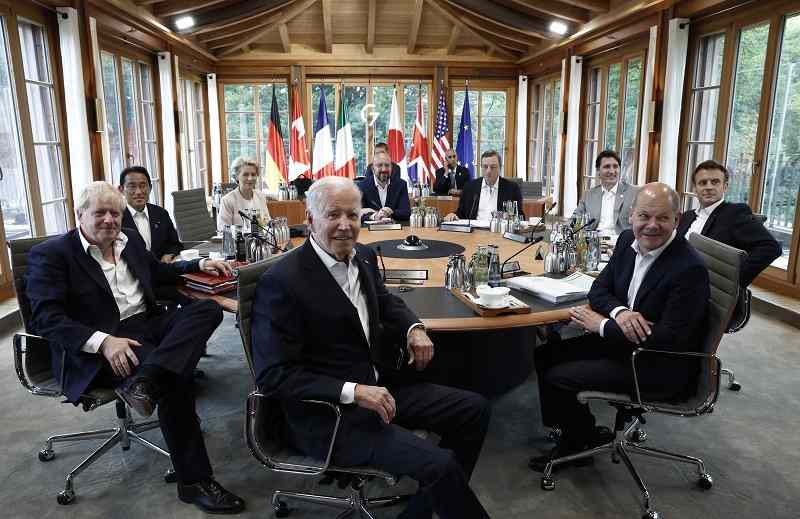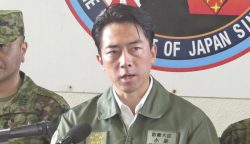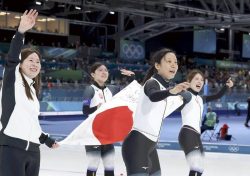
Leaders participating in the G7 summit pose for a photo in Elmau, Germany, on Tuesday.
16:17 JST, June 29, 2022
ELMAU, Germany — The Group of Seven industrialized nations agreed during their summit talks, which wrapped up on Tuesday, to continue support for Ukraine until Russia ends its invasion, demonstrating solidarity toward that purpose.
The G7 also announced a plan to focus on assistance to developing countries to show its determination as leaders of the democratic bloc to fight against authoritarian states. However, the G7 has not come up with an exit strategy for Russia’s prolonged invasion of Ukraine, and there are still many issues to be addressed.
No atmosphere for ‘negotiation’
“At a time when the world is threatened by division and shocks, we, the G7, stand united,” the G7 said in its communique released Tuesday.
The communique reiterated the G7’s condemnation of Russia’s invasion and clarified its stance to make concerted efforts to respond. “We will continue to impose severe and enduring costs on Russia to help bring an end to this war,” it said.
Prior to the summit in southern Germany, it had been argued that differences were widening among the G7 nations as the invasion has become prolonged. Germany and France, which had good economic relations with Russia, have distanced themselves from the United Kingdom, Canada and other countries that insist on a tough response.
Germany chaired the summit, held four months after the start of the invasion, and was said to be trying to find ways to ease tensions during the talks.
However, Russia continued shelling various parts of Ukraine during the summit, as if to provoke the G7. An atmosphere of seeking peace negotiations with Russian President Vladimir Putin did not develop; rather, the shelling led the G7 to take a more clearly confrontational stance.
“We all agree that President Putin must not win this war,” said German Chancellor Olaf Scholz at a press conference after the summit’s close. “There is only one way out: for Putin to accept that his plans in Ukraine will not succeed.”
Change by force
U.S. President Joe Biden led the discussions at the summit about support measures for Ukraine. Biden regards himself as the standard-bearer of the democracy camp, and he sees Russia’s invasion as an unforgivable outrage. If Russia’s attempt to change the status quo by force goes unpunished, it will send the wrong message to China and the authoritarian camp will consequently gain momentum, which could lead to a collapse of the international order.
With this sense of crisis in the background, Biden has reiterated that Ukraine is fighting to defend democracy. During a Monday discussion that Ukraine President Volodymyr Zelenskyy joined online, the U.S. president immediately pledged to provide Ukraine with an advanced air defense system when Zelenskyy asked for it.
Biden also led the discussions on strengthening sanctions against Russia. U.S. officials, under Biden’s direction, persistently tried to persuade European nations to adopt a cap on the price of Russian oil, in addition to a ban on imports of Russian gold.
Struggle with China, Russia
“Together, the G7 is demonstrating the strong global leadership it will take to maximize the costs to Putin and his enablers and address the impact of his war on the global economy,” Biden wrote on his Twitter account on Monday.
In contrast to his predecessor Donald Trump, who thought little of the G7 framework, Biden regards the G7 as the core of the democracy bloc to stand against the authoritarian camp.
In addition to discussing support for Ukraine, the G7 also proposed food aid to African and other countries and announced the creation of a new framework to promote infrastructure investment with developing countries in mind. Those plans were hammered out to show the strong presence of the G7, so that developing and emerging countries will not get closer to China and Russia.
China and Russia were not sitting idly by, either. During the G7 summit, they intensified their efforts to expand the current BRICS framework comprising Brazil, Russia, India, China and South Africa.
The true value of the G7 is being tested in the struggle with China and Russia.
Top Articles in Politics
-

Japan PM Takaichi’s Cabinet Resigns en Masse
-

LDP Wins Historic Landslide Victory
-

LDP Wins Landslide Victory, Secures Single-party Majority; Ruling Coalition with JIP Poised to Secure Over 300 seats (UPDATE 1)
-

CRA Leadership Election Will Center on Party Rebuilding; Lower House Defeat Leaves Divisions among Former CDPJ, Komeito Members
-

Japan Tourism Agency Calls for Strengthening Measures Against Overtourism
JN ACCESS RANKING
-

Japan Institute to Use Domestic Commercial Optical Lattice Clock to Set Japan Standard Time
-

Israeli Ambassador to Japan Speaks about Japan’s Role in the Reconstruction of Gaza
-

Man Infected with Measles May Have Come in Contact with Many People in Tokyo, Went to Store, Restaurant Around When Symptoms Emerged
-

Prudential Life Insurance Plans to Fully Compensate for Damages Caused by Fraudulent Actions Without Waiting for Third-Party Committee Review
-

Woman with Measles Visited Hospital in Tokyo Multiple Times Before Being Diagnosed with Disease





















